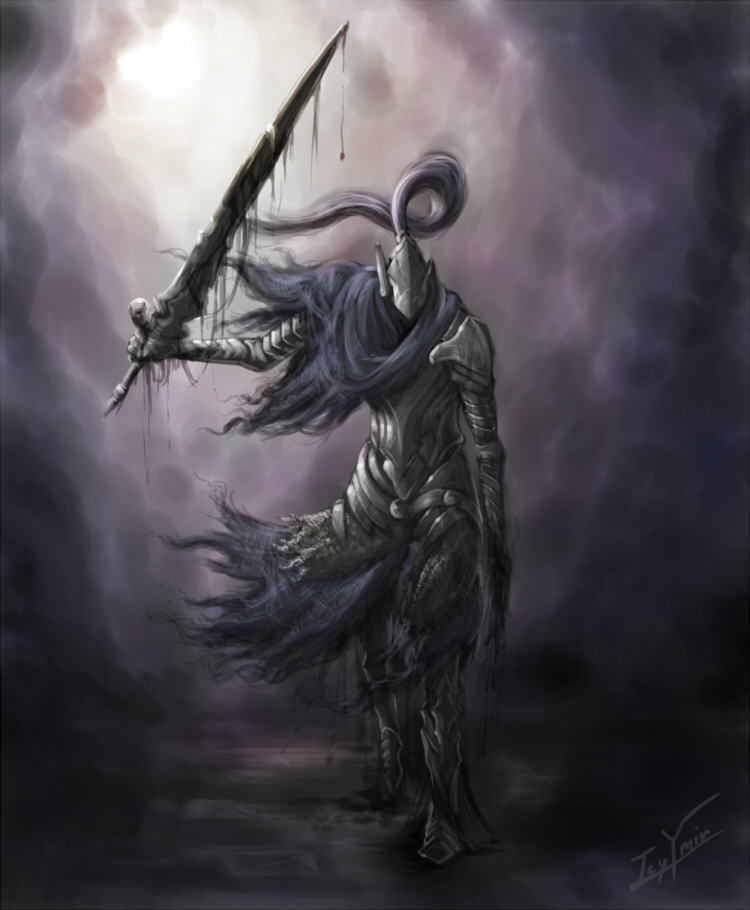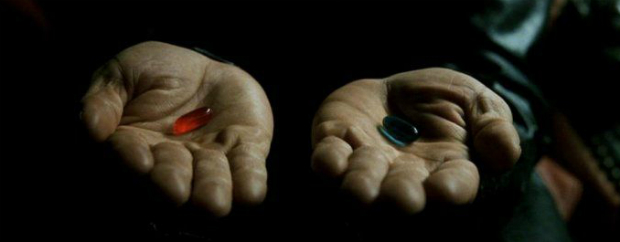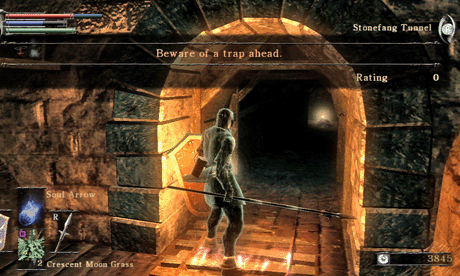To
cap off this series I want to examine something that has been cropping
up in the electronic medium for many years but has been a core aspect of
tabletop RPG's since their inception. Player agency as determined by
choices and consequences, or in Dark Souls' case: Sin and Punishment.
Choice in games has been receiving plenty and plenty
of talk, praise, derision, pros/cons, thoughtful analysis and frequent
morality system bashing. Anyone familiar with old-timey computer RPG's will
know that they can make legitimate choices that have an affect on the
game, not always affecting the outcome or even causing a significant deviation in the ending but at the very least some meaningful effect on the story or
the gameplay. Unfortunately those developments were completely ignored for the most part in
much of console gaming's history until recent years. Where morality systems and
choice started filtering in as the next big thing those of us with
Pen & Paper roots tended to scoff at the new innovation because the choices added little of
value and were for the most part an illusion.
I like to stress legitimate choice, where your choice can have a decided effect on the continuing narrative or mechanics. If your choice does neither of these, or pays the barest amount of lip service then you have deprived the player of agency the moment they see through the wool you've pulled over their eyes. Now some will actually praise the illusion of choice; from a design perspective convincing players that they have made a choice can save quite a bit of money without having to either create alternating storylines (mad respect to the Witcher 2 developers for creating two distinctly different storylines) or even immediate savings where one voiced dialogue response can accommodate multiple dialogue choices. Of course the moment a player figures that out you begin to rob them of their sense of immersion, the ennui sets in when you find things are predetermined. We enjoy games where our heroes rebel against fate, yet here we have design decisions that when exposed leave our heroic fantasy tattered and drained. As we've discussed before Dark Souls will tear you limb from limb but will leave your spirit in tact, unless you spend too much time wandering the abyss.
I like to stress legitimate choice, where your choice can have a decided effect on the continuing narrative or mechanics. If your choice does neither of these, or pays the barest amount of lip service then you have deprived the player of agency the moment they see through the wool you've pulled over their eyes. Now some will actually praise the illusion of choice; from a design perspective convincing players that they have made a choice can save quite a bit of money without having to either create alternating storylines (mad respect to the Witcher 2 developers for creating two distinctly different storylines) or even immediate savings where one voiced dialogue response can accommodate multiple dialogue choices. Of course the moment a player figures that out you begin to rob them of their sense of immersion, the ennui sets in when you find things are predetermined. We enjoy games where our heroes rebel against fate, yet here we have design decisions that when exposed leave our heroic fantasy tattered and drained. As we've discussed before Dark Souls will tear you limb from limb but will leave your spirit in tact, unless you spend too much time wandering the abyss.
In
Dark Souls you are perfectly within your rights to go on an
extermination spree but the consequences can be most dire. Since this is a
harsh world you can expect the friendly residents to be just as well
equipped to face nightmarish land as you. After your sudden and inexplicable betrayal expect the battles to be
rough. Furthermore, if you happen to lust after the souls of
Firekeepers you can say goodbye to rest, recuperation and a home base. To finalize your wrongdoing and betrayal you are deemed a Sinner. To seek absolution you must pay an indulgence which costs a great deal many Souls (all-purpose currency and experience) and the amount is tied directly to your level. The longer you put it off and grow in strength the heavier the burden of your sin.
While I don't like fixed rates because it means that people with money have no consequences the rate at which Dark Souls penalizes you is pretty severe (later halved as I recall in a future patch) and for many repenting is simply not worth the cost. Especially since the consequence of sin typically means you can no longer associate with people in that covenant or area. It doesn't help there are some petty sins such as saying no to the resident Cheshire Fat Cat. On the opposite side of the spectrum you can commit an irredeemable sin by stealing the Sun from Anor Londo at which point the inhabitants and avenging players may begin invading your darkened realm as they please. Sin meet Punishment.
One improvement over
the original Demon's Souls is the Blade of the Darkmoon Covenant. This covenant allowed players to hound sinners
and bring them just punishment for the sin of invading another world. Avenging spirits rather than vengeful
ones gave players who did not like the notion of invading a world to
steal their power and poptarts a reason to take advantage of a
wondrously engaging system.
 |
| Artorias the Abysswalker by IcyYmir |
While I don't like fixed rates because it means that people with money have no consequences the rate at which Dark Souls penalizes you is pretty severe (later halved as I recall in a future patch) and for many repenting is simply not worth the cost. Especially since the consequence of sin typically means you can no longer associate with people in that covenant or area. It doesn't help there are some petty sins such as saying no to the resident Cheshire Fat Cat. On the opposite side of the spectrum you can commit an irredeemable sin by stealing the Sun from Anor Londo at which point the inhabitants and avenging players may begin invading your darkened realm as they please. Sin meet Punishment.
 |
| Muted grandeur, Veiled Illusions, the Twilight of the God's City |
Rather than dwell too much
on Dark Souls I'd actually like to take a moment to switch gears and
look at Demon's Souls, the direct predecessor. While Dark Souls takes
many aspects of Demon's Souls and polishes them to a lustrous shine,
choice is certainly improved but consequence falls by the wayside;
rather meager in comparison. In Demon's Souls you had an esoteric
system that determined how well each world you visited was doing called
World Tendency which shined white or gloomy black. White represented
removing evil from the world while Black contributed to it. The system
was never explained outside of trial-and-error and many were unaware of
it.
To give you an example each time you died in Human form it increased Black WT, given how easy it is to die especially considering how unused many are to the old school lethality you can see how easy it is to begin careening into Black WT right off the bat. To add insult to injury you become human each time you defeat a Boss Demon (which raises White WT mind you) so the moment you fall off an abusively narrow walkway or stumble face first into a mutilating trap or ambush you lose your human form and any progress towards White WT. Frustrating to say the least but there are still a few gems among the rough. First let's examine Black and White WT.
In White WT enemies do less damage, healing moon grass is more prevalent, your phantom form is strengthened and beneficial events or areas can be unlocked. As you rid the world of evil the abilities granted are thematic and beneficial, however, they can hurt you in the long run. You see should you go the route of greed and evil and head down the slippery slope darkening your world you are more likely to find upgrade stones, enemies are more likely to drop rare items and your phantom form is weakened. So being greedy will get its own rewards but it will also get its just desserts. Enemies become stronger, Black Phantoms of regular enemies will spawn in unfortunate places. To put the icing on the cake you will also spawn the evil version of the legendary figures in the game when you reached the darkest night of your world. In an ironic twist your greed precludes you from their armor; you see in black-WT they have already died and are naught but spirits, which is why their warped minds hunt you down. Whereas in White-WT they are still in human form and have their wits about them. The exotic armor they wear are yours for the taking in White WT but doing so will plunge the world into darkness. Their far more impressive weapons however are only available in Pure Black WT which in my mind runs counter-productive, ah well.
Now changing world tendency is not the easiest thing to do. To increase White WT you could defeat a Boss Demon, defeat optional dragons, defeat black phantoms (red colored corrupted phantoms invading your world to devour your delicious soul). Virtually all of these required you to exceed at combat. The problem is, when you are in black-world tendency the enemies are quite a bit stronger so this spiral of doom is looking worse and worse. Shifting over to the doom and gloom is pretty easy provided you are the bearer or bringer of death. Crawling out of that hole is another thing entirely especially if you grow to like your reflection in the abyss.
To give you an example each time you died in Human form it increased Black WT, given how easy it is to die especially considering how unused many are to the old school lethality you can see how easy it is to begin careening into Black WT right off the bat. To add insult to injury you become human each time you defeat a Boss Demon (which raises White WT mind you) so the moment you fall off an abusively narrow walkway or stumble face first into a mutilating trap or ambush you lose your human form and any progress towards White WT. Frustrating to say the least but there are still a few gems among the rough. First let's examine Black and White WT.
In White WT enemies do less damage, healing moon grass is more prevalent, your phantom form is strengthened and beneficial events or areas can be unlocked. As you rid the world of evil the abilities granted are thematic and beneficial, however, they can hurt you in the long run. You see should you go the route of greed and evil and head down the slippery slope darkening your world you are more likely to find upgrade stones, enemies are more likely to drop rare items and your phantom form is weakened. So being greedy will get its own rewards but it will also get its just desserts. Enemies become stronger, Black Phantoms of regular enemies will spawn in unfortunate places. To put the icing on the cake you will also spawn the evil version of the legendary figures in the game when you reached the darkest night of your world. In an ironic twist your greed precludes you from their armor; you see in black-WT they have already died and are naught but spirits, which is why their warped minds hunt you down. Whereas in White-WT they are still in human form and have their wits about them. The exotic armor they wear are yours for the taking in White WT but doing so will plunge the world into darkness. Their far more impressive weapons however are only available in Pure Black WT which in my mind runs counter-productive, ah well.
Now changing world tendency is not the easiest thing to do. To increase White WT you could defeat a Boss Demon, defeat optional dragons, defeat black phantoms (red colored corrupted phantoms invading your world to devour your delicious soul). Virtually all of these required you to exceed at combat. The problem is, when you are in black-world tendency the enemies are quite a bit stronger so this spiral of doom is looking worse and worse. Shifting over to the doom and gloom is pretty easy provided you are the bearer or bringer of death. Crawling out of that hole is another thing entirely especially if you grow to like your reflection in the abyss.
All-in-all I rather like the World Tendency system though
it isn't even close to perfect. I like the basic effects it has on enemies and the world although I would prefer if there were more of a middle ground rather than letting Pure White and Pure Black events get all the fun. The balancing act is very exciting and I
could see World Tendency makings its way into any game setting where the
PC's have a direct effect on reality, or anywhere that an ancient
ritual such as in the case of Demon's Souls has allowed malice,
altruism and death to affect the spirituality of the world. Either way,
it's certainly a noteworthy and absolutely immersive design decision
and that alone commands quite a bit of respect from yours truly.
Find the beginning of the series examining the OSR values present in Dark Souls here.
Find the beginning of the series examining the OSR values present in Dark Souls here.







No comments:
Post a Comment